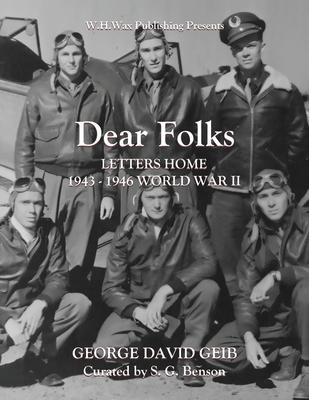George David Geib served as a pilot in the US Army Air Force during World War II. In his frequent letters home, he chronicled his training and travels, which included sailing across the Atlantic on the luxury-liner-turned-troop-transport, the Queen Mary.
Stationed first in England and later in France, he piloted troops, prisoners, and supplies across the European Theater of Operations. He dropped glider planes across enemy lines, and he experienced the terror of being fired upon by anti-aircraft weapons. After the war, he flew VIPs and Allied troops all across Europe, and he had the opportunity to observe the Nuremberg Trials for a day.
His mother saved his letters and presented them to him when he returned home after the war. He lugged them around with him for decades, through many moves and career changes. Finally, in 1989, he realized that this historical treasure trove would be lost forever unless he did something with it. Transcribing took him nearly four years. He carted the manuscript to his local quick print shop and ran off thirty copies to give to family and friends.
George, the young pilot, wrote with wit and youthful enthusiasm. His transcription fifty years later tempered that exuberance with clear and introspective hindsight, added in italics. From his humorous anecdote about passing the induction physical, to colorful descriptions of the bases where he was stationed, to his impressions of Europe, the people he met, and the places he visited, the letters are authentic and rich in detail.
Three decades later, his daughter rediscovered her copy, along with her late parents' only remaining one. She realized that, once again, these stories could be lost to posterity. She honored his memory by formally publishing them in the year he would have celebrated his one-hundredth birthday.
The collection offers an inside look at military life during wartime through the eyes of a young pilot. It delves into the nitty gritty of army life, from stateside training camps to British military bases to tent cities in France. Seasoned with the musical hits and popular films of the day and contrasted against a backdrop of family back home during times of sacrifice, rationing, and worry, it will draw readers in and immerse them in history. This is a well-crafted account of, as George phrased it, ". . . the life and times of one United States Army Air Force cadet who became a pilot in the Troop Carrier Command in World War II."
